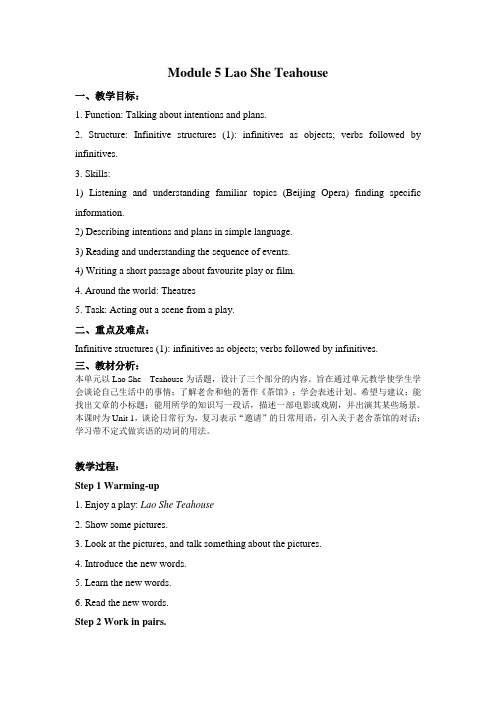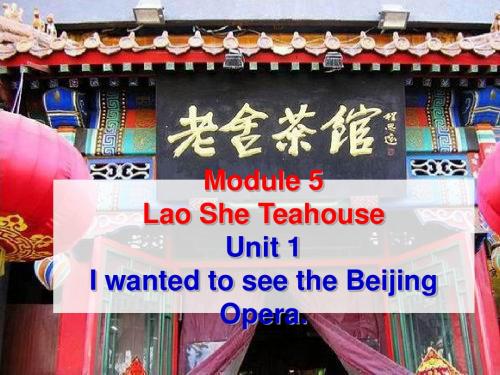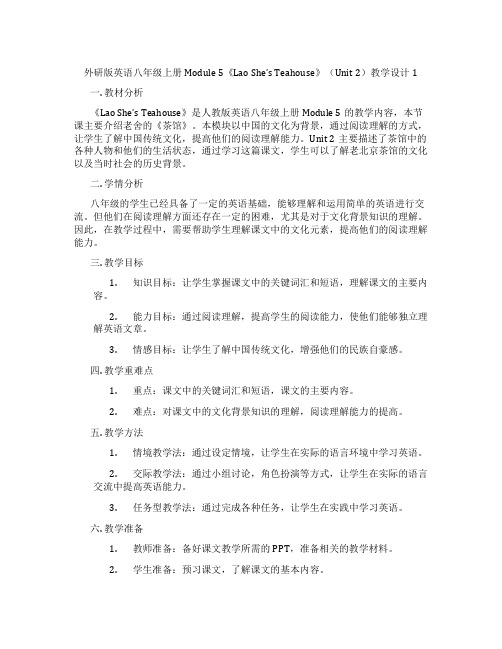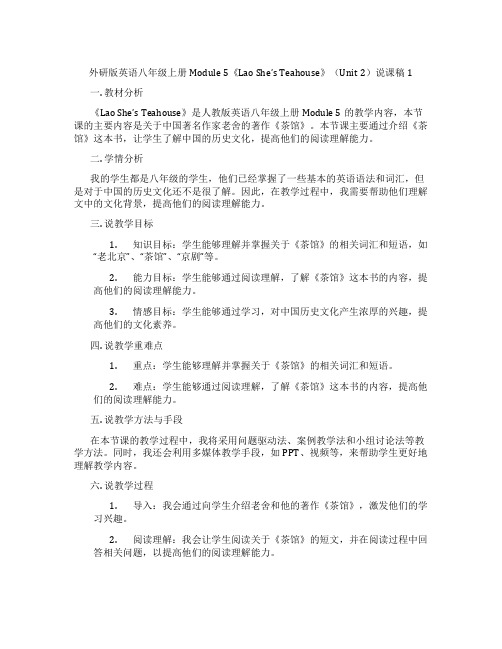英语外研(新标准)版八年级上Module 5 Lao Shes TeahouseUnit 3 Language in use(共47张PPT)&79575
外研(新标准)版2021-2022学年初中英语八年级上册Module 5 Lao She's Tea

外研(新标准)版2021-2022学年初中英语八年级上册Module 5 Lao She's Teahouse单元测试卷B卷一、单项选择 (共10题;共10分)1. (1分) The air ________ very fresh now. ________ go out for a walk.A . be;LetB . was;Let'sC . is;Let'sD . are;Let us2. (1分) (2017八下·枣阳期中) —The doctor told me not to eat too much,but I find it difficult.—The doctor is right.________ you eat, ________ you will be.A . The less;the healthierB . The less;the more healthierC . The more;the healthierD . The more;the more healthier3. (1分)—________ is your brother?—He is 1.47 metres tall .A . How highB . How tallC . How longD . How far4. (1分)(2019·张家港模拟) —Sandy, your mobile phone is ringing.—Wait a moment! It's dangerous it while crossing the street.B . to answerC . answeringD . answers5. (1分) Bob, someone is you at the school gate.A . waiting forB . thinking aboutC . writing toD . looking after6. (1分) Look ________ the map, please.A . inB . atC . toD . of7. (1分)(2019·邹平模拟) Susan is ________ than me, and she is one of ________ students in our class.A . a lot friendlier, most popularB . very friendlier, the most popularC . much friendly, most popularD . even friendlier, the most popular8. (1分)— How _____ do you sleep every night?— About 8 hours.B . muchC . longD . often9. (1分) He refused _______my book, so I was very angry.A . returnB . returningC . to returnD . returned10. (1分) (2019八下·秦淮期中) My teacher asked me _______ late for school any more.A . not beingB . not to beC . not beD . don't be二、完形填空 (共1题;共1分)11. (1分) (2019八上·浦东期末) 1 Choose the best words or expressions and complete the passage. (选择最恰当的单词或词语完成短文。
外研(新标准)版八年级上Module5 Lao Shes Teahouse模块导学课件(共93张PPT)

句型
(1)In the 1920s, people began to translate his works into English. (2)It was easy for everyone to understand the story and see the changes in Chinese society.
动词不定式(1)和双宾语
语法
Module 5 Lao She Teahouse Unit 1
Ⅰ. 单词拼写
1. offer (v. )
2. end (n. & v. ) 3. 茶馆 (n. ) 4. actor (n. ) 答案: 1. 提议; 提出
______________
______________ ______________ →________________(n. )女演员 2. 末尾; 结束 3. teahouse 4. actress
Modulபைடு நூலகம் 5 Lao She Teahouse 精讲导学 巧练激活
【导语】同一种事物 , 不同的人体验 , 结果肯定是不一样的 , 所以, 别人的话只能作为建议, 无论有利与否, 都得自己试试, 遇事多动脑, 才会知道答案。
A Little Horse Crossing the River There were an old horse and a little horse on a farm. One day the old horse asked the little horse to send the wheat to the mill. The little horse was very happy to do that. But he met a river on his road
外研新版八上Module_5_Lao_She_Teahouse

Module 5 Lao She Teahouse一、教学目标:1. Function: Talking about intentions and plans.2. Structure: Infinitive structures (1): infinitives as objects; verbs followed by infinitives.3. Skills:1) Listening and understanding familiar topics (Beijing Opera) finding specific information.2) Describing intentions and plans in simple language.3) Reading and understanding the sequence of events.4) Writing a short passage about favourite play or film.4. Around the world: Theatres5. Task: Acting out a scene from a play.二、重点及难点:Infinitive structures (1): infinitives as objects; verbs followed by infinitives.三、教材分析:本单元以Lao She Teahouse为话题,设计了三个部分的内容。
旨在通过单元教学使学生学会谈论自己生活中的事情;了解老舍和他的著作《茶馆》;学会表述计划、希望与建议;能找出文章的小标题;能用所学的知识写一段话,描述一部电影或戏剧,并出演其某些场景。
本课时为Unit 1,谈论日常行为,复习表示“邀请”的日常用语,引入关于老舍茶馆的对话;学习带不定式做宾语的动词的用法。
教学过程:Step 1 Warming-up1. Enjoy a play: Lao She Teahouse2. Show some pictures.3. Look at the pictures, and talk something about the pictures.4. Introduce the new words.5. Learn the new words.6. Read the new words.Step 2 Work in pairs.1. Ask the students to read the words in the box in Activity 1.actress dance music play sing teahouse theatre traditional2. Look at the pictures in Activity 1, and talk about them.3. Work in pairs. Use the words from the box to help you.Step 3 Listening practice.1. Ask the students to read through the sentences in Activity2.1) Betty often sees / wants to see some traditional Beijing opera.2) Betty knows / doesn’t know Lao She Teahouse.3) Lingling says that the opera is easy / difficult to understand.2. Play the recording once without stopping.3. Listen and underline the correct words or expressions.Step 4 Listen and read.1. Ask the students to read the conversation silently.2. Play the recording and ask the students to listen and read the conversation.3. Read the conversation and find useful expressions.4. Learn “Everyday English”1) How was it?2) You know, …3) That’s the main thing.4) No idea.Step 5 Check the true sentences.1. Ask the students to read the conversation again.2. Now check the true sentences.1) Tony went to Lao She Teahouse with Betty and Lingling.2) Betty understood the opera.3) Lingling and Betty stayed longer than they planned.4) Betty enjoyed the opera.5) Betty would like to go to the opera again.6) Betty knew about Lao She before she went to the teahouse.3. Ask the students to check with a partner.4. Check the answers:Keys: 1. ×2. ×3. √4. √5. √6.×Step 6 Complete the passage.1. Ask the students to read the words in the box in Activity 4.actress difficult end main offer2. Read through the passage.Betty wanted to see the Beijing opera, so Lingling (1) ________ to take Betty to Lao She Teahouse. The words of the opera were (2) ________ to understand, but the actors and (3)__________ were excellent. They only planned to watch for an hour, but in the (4) ________, they stayed for three hours. Betty thought it was interesting — that was the (5) ________ thing!3. Complete the passage with the correct form of the words from the box.4. Ask the students to check with a partner.5. Check the answers:Keys: 1. offered 2. difficult 3. actresses 4. end 5. mainStep 7 Listen and repeat. (pronunciation and speaking )1. Play the recording once without stopping.2. Play the recording again and ask the whole class to repeat.1) — Do you want to see the Beijing opera?—Yes, I’d love to.2) — Do you want to come to Lao She Teahouse with me?—Yes, please. I’d like to go with you.3. Ask the students to listen and mark the intonation.4. Now listen again and repeat.Step 8 Important and difficult points (write on a small Bb. )1. — Who is Lao She? 老舍是谁?— No idea. 不知道。
英语外研八年级上册Module 5 Lao She Teahouse

课后回顾
本课时主要பைடு நூலகம்型
1) -How was it? -It was great.
2) That’s the main thing. 3) No idea. 4) You know… 5) I wanted to … 6) I hoped to …
Betty wanted to see the Beijing Opera, so Lingling (1) _o_ff_e_r_ed_ to take Betty to Lao She Teahouse.
The words of the opera were (2) __d_if_f_ic_u_ltto understand, but the actors and (3) _ac_t_re_s_s_e_s_were excellent. They only planned to watch for an hour, but in the (4)___e_n, dthey stayed for three hours. Betty thought it was interesting-that was the (5) _____mthaiinng!
language.
to learn
4. He agreed _____ (get) someone to help us.
to get
5. I told him ___n_o__t _to__p(lnaoyt play) in the
street.
6. Would you like ____t_o__co(cmome e) with me? 7. Your task is ____t_o_ f(ifnindd) the cost of
外研版八年级上册 Module 5 Lao She Teahouse

1.我想看京剧,所以玲玲主动提出带我去那儿。
❖offer /v./提议,提出结构①offer sth 提供某物①offer to do sth提出做某事③offer sb sth=offer sth to sb主动给某人提供某物offer n. 主动提议;特价turn down an offer 拒绝提议 a special offer 特价优惠Our English teacher always offers help _________(介词) us.She offered _____________ (drive) me home.小男孩主动把自己的座位让给了这位老人。
(2)The little boy____________the old man_____________.= The little boy_________________________the old man.She offered___________the old woman_______ the street. 她主动帮助老年妇女过马路。
【拓展】provide v.提供provide sb with sth= provide sth for sb给某人提供某物2.But the actors and actress es were excellent. 但是男演员和女演员都很优秀。
❖actress 女演员an actressI think the woman is one of the best a________(女演员). I like her movies very much.【拓展】一般“女”的后缀是-woman, -ess; 一般“男”的后缀是-man, -er/-or等actor男演员, actress女演员;waiter男服务员, waitress女服务员;host男主人, hostess女主人;salesman男销售, saleswoman女销售;spokesman男发言人, spokeswoman女发言人3.We only planned to watch for an hour, but in the end, we stayed for 3 hours.我们只计划看一个小时,但是最后,我们待了三个小时。
外研版英语八年级上册Module 5《Lao She’s Teahouse》(Unit 1)教学设计

外研版英语八年级上册Module 5《Lao She’s Teahouse》(Unit 1)教学设计一. 教材分析《Lao She’s Teahouse》是人教版初中英语八年级上册Module 5的教学内容。
本节课主要介绍老舍的著作《茶馆》,通过学习这篇课文,学生可以了解到中国近代史上不同阶层的人物的生活状态,以及他们对待生活的态度。
教材内容丰富,涉及词汇、语法、阅读理解等多个方面,有利于提高学生的综合语言运用能力。
二. 学情分析初中八年级的学生已经具备了一定的英语基础,能够运用英语进行简单的交流。
但他们在阅读理解、词汇积累以及语法运用方面还存在一定的困难。
因此,在教学过程中,需要关注学生的个体差异,合理安排教学内容,调动学生的学习积极性,提高他们的阅读理解能力和语言运用能力。
三. 教学目标1.知识目标:学生能够掌握本节课的重点词汇和短语,如“drama, character, actor, actress, modern”等;学生能够理解课文内容,了解《茶馆》的故事背景和人物关系;学生能够运用所学的词汇和语法知识,进行简单的阅读理解和口语表达。
2.能力目标:学生能够提高阅读理解能力,通过阅读课文,获取和处理信息;学生能够在日常生活中运用所学的英语知识进行交流。
3.情感目标:学生能够培养对英语学习的兴趣,增强自信心;学生能够理解课文中所反映的社会现象,培养正确的人生观和价值观。
四. 教学重难点课文内容的理解;重点词汇和短语的掌握;运用所学的词汇和语法知识进行阅读理解和口语表达。
课文中长难句的理解;词汇的灵活运用;语法知识的运用。
五. 教学方法1.任务型教学法:通过设置各种任务,让学生在完成任务的过程中,运用所学知识,提高语言运用能力;2.情境教学法:创设各种情境,让学生在真实的语境中学习英语,提高学习兴趣;3.小组合作学习:鼓励学生相互合作,共同完成学习任务,培养团队精神;4.反馈与评价:及时给予学生反馈,鼓励他们积极参与学习,提高自信心。
外研版八年级上module_5_lao_she_teahouse_unit_1

Find out more information about theatres. Choose a scene and practise
it, then act out the scene in front of the
class next lesson.
actress the Beijing Opera
Teahouse
Lao She Teahouse
话剧《茶馆》 Lao She Teahouse
Lao She Teahouse ቤተ መጻሕፍቲ ባይዱowadays
Inside of Lao She Teahouse
Inside of the teahouse
Listen to the conversation and answer the questions.
Find these phrase in the dialogue
1.How was it? 2.You know… 3.Lingling offered to take me there. 4.It was difficult to understand the words. 5.Plan to do sth. 6. in the end 7.That’s the main thing.
你知道的 看京剧 计划干某事 主动提出带 我们去那儿 5. 以……著名 6. 希望做某事 7. 怎么样? 8. 不知道. 1. 2. 3. 4.
you know see some Beijing Opera plan to do sth. offer to take us there
be famous for=be known for hope to do sth. How was it? No idea. =I’ve no idea
外研版英语八年级上册Module 5《Lao She’s Teahouse》(Unit 2)教学设计

外研版英语八年级上册Module 5《Lao She’s Teahouse》(Unit 2)教学设计1一. 教材分析《Lao She’s Teahouse》是人教版英语八年级上册Module 5的教学内容,本节课主要介绍老舍的《茶馆》。
本模块以中国的文化为背景,通过阅读理解的方式,让学生了解中国传统文化,提高他们的阅读理解能力。
Unit 2主要描述了茶馆中的各种人物和他们的生活状态,通过学习这篇课文,学生可以了解老北京茶馆的文化以及当时社会的历史背景。
二. 学情分析八年级的学生已经具备了一定的英语基础,能够理解和运用简单的英语进行交流。
但他们在阅读理解方面还存在一定的困难,尤其是对于文化背景知识的理解。
因此,在教学过程中,需要帮助学生理解课文中的文化元素,提高他们的阅读理解能力。
三. 教学目标1.知识目标:让学生掌握课文中的关键词汇和短语,理解课文的主要内容。
2.能力目标:通过阅读理解,提高学生的阅读能力,使他们能够独立理解英语文章。
3.情感目标:让学生了解中国传统文化,增强他们的民族自豪感。
四. 教学重难点1.重点:课文中的关键词汇和短语,课文的主要内容。
2.难点:对课文中的文化背景知识的理解,阅读理解能力的提高。
五. 教学方法1.情境教学法:通过设定情境,让学生在实际的语言环境中学习英语。
2.交际教学法:通过小组讨论,角色扮演等方式,让学生在实际的语言交流中提高英语能力。
3.任务型教学法:通过完成各种任务,让学生在实践中学习英语。
六. 教学准备1.教师准备:备好课文教学所需的PPT,准备相关的教学材料。
2.学生准备:预习课文,了解课文的基本内容。
七. 教学过程1.导入(5分钟)通过展示老北京的茶馆图片,引导学生谈论他们对茶馆的了解,激发他们的学习兴趣。
2.呈现(10分钟)教师通过PPT呈现课文的主要内容,让学生初步理解课文。
3.操练(15分钟)学生分角色朗读课文,模仿课文中的人物说话,提高他们的语言表达能力。
外研版英语八年级上册Module5《LaoShe’sTeahouse》(Unit1)说课稿

外研版英语八年级上册Module 5《Lao She’s Teahouse》(Unit 1)说课稿一. 教材分析《Lao She’s Teahouse》(Unit 1)是外研版英语八年级上册Module 5的一篇阅读课文。
本节课文主要介绍了老舍的《茶馆》,通过讲述茶馆里的人物和故事,展示了老北京的历史文化。
课文内容丰富,语言生动,充满了烟火气。
本节课主要围绕茶馆里的三位角色——王利发、常四爷和秦仲义展开,通过他们的对话和独白,揭示了各自的性格特点以及他们所代表的社会阶层。
二. 学情分析八年级的学生已经具备了一定的英语基础,能够理解和运用简单的英语进行交流。
但他们在阅读长篇文章时,可能会遇到一些生词和短语的理解困难,因此需要在教学过程中加以引导和帮助。
此外,学生对于老北京的历史文化可能了解不多,需要在课前进行相关背景知识的介绍。
三. 说教学目标1.知识目标:学生能够掌握课文中的生词和短语,理解课文大意,把握人物性格特点。
2.能力目标:学生能够运用所学知识进行口语交流,提高阅读理解能力。
3.情感目标:通过学习课文,学生能够了解老北京的历史文化,增强对祖国文化的自豪感。
四. 说教学重难点1.教学重点:课文生词和短语的学习,阅读理解能力的提高。
2.教学难点:人物性格特点的把握,对老北京历史文化的理解。
五. 说教学方法与手段1.教学方法:采用任务型教学法,让学生在完成任务的过程中,提高英语运用能力。
2.教学手段:利用多媒体课件、图片等辅助教学,激发学生学习兴趣。
六. 说教学过程1.导入:教师通过展示老北京的图片,引导学生谈论自己对北京的了解,为新课的学习营造氛围。
2.读前预测:教师引导学生根据课文标题和图片,预测课文内容。
3.自主学习:学生自主阅读课文,遇到生词和短语时,可以查阅词典或与同桌讨论。
4.合作学习:学生分组讨论,分析课文人物性格特点,总结各自的代表意义。
5.课堂展示:各小组代表向全班同学展示讨论成果,其他同学可进行补充和评价。
外研版英语八年级上册Module5《LaoShe’sTeahouse》(Unit2)说课稿1

外研版英语八年级上册Module 5《Lao She’s Teahouse》(Unit 2)说课稿1一. 教材分析《Lao She’s Teahouse》是人教版英语八年级上册Module 5的教学内容,本节课的主要内容是关于中国著名作家老舍的著作《茶馆》。
本节课主要通过介绍《茶馆》这本书,让学生了解中国的历史文化,提高他们的阅读理解能力。
二. 学情分析我的学生都是八年级的学生,他们已经掌握了一些基本的英语语法和词汇,但是对于中国的历史文化还不是很了解。
因此,在教学过程中,我需要帮助他们理解文中的文化背景,提高他们的阅读理解能力。
三. 说教学目标1.知识目标:学生能够理解并掌握关于《茶馆》的相关词汇和短语,如“老北京”、“茶馆”、“京剧”等。
2.能力目标:学生能够通过阅读理解,了解《茶馆》这本书的内容,提高他们的阅读理解能力。
3.情感目标:学生能够通过学习,对中国历史文化产生浓厚的兴趣,提高他们的文化素养。
四. 说教学重难点1.重点:学生能够理解并掌握关于《茶馆》的相关词汇和短语。
2.难点:学生能够通过阅读理解,了解《茶馆》这本书的内容,提高他们的阅读理解能力。
五. 说教学方法与手段在本节课的教学过程中,我将采用问题驱动法、案例教学法和小组讨论法等教学方法。
同时,我还会利用多媒体教学手段,如PPT、视频等,来帮助学生更好地理解教学内容。
六. 说教学过程1.导入:我会通过向学生介绍老舍和他的著作《茶馆》,激发他们的学习兴趣。
2.阅读理解:我会让学生阅读关于《茶馆》的短文,并在阅读过程中回答相关问题,以提高他们的阅读理解能力。
3.小组讨论:我会让学生分组讨论,分享他们对于《茶馆》这篇文章的理解和感受,以培养他们的合作意识和交流能力。
4.文化讲解:我会向学生讲解《茶馆》中所涉及的中国历史文化,帮助他们更好地理解文章内容。
5.总结:我会对本节课的内容进行总结,并布置相关的作业,让学生进行巩固练习。
七. 说板书设计板书设计如下:老舍和他的《茶馆》通过板书,学生可以一目了然地了解本节课的主要内容。
外研版八上Module 5 Lao She’s Teahouse

动词不定式词组th. decide to do sth. remember to do sth.
forget to do sth. stop to do sth. agree to do sth. hope to do sth. like to do sth.
Complete the passage with the correct form of the words in brackets.
Lu Xun is one of the greatest writers of modern China. He was born in Shaoxing, Zhejiang Province, in 1881. At first, Lu Xun hoped (1) __to__h_e_l_p___ (help) the Chinese people become healthy and strong, so he decided (2) _t_o__b_e__ (be) a doctor. After a few years,
The play was very good and all the actors were excellent. The story (3) _t_o_o_k_p__la_c_e_ in a small village in China. It was all about an old box of gold! The box was a (4) _m__a_g_i_c_ box and was difficult to open. The play was very interesting, and everyone (5) _c_h_e_e_r_e_d__ at the end of the play!
外研版八上英语Module 5 Lao She Teahouse Unit 1

由"act(v.扮演)+-(r)ess(名词后缀)"构成,复数形式为actresses。其对应词为actor"男演员"。
Of all the actresses,I admire Audrey Hepburn most.在所有女演员中,我最钦佩奥黛丽· 赫本。(选自镇江中考)
典例 (宜昌中考)—In the past five years, China has played an important role in the Belt and Road.—It has ___ many nations a great chance to communicate.
A
A.offered B.supported C.included D.directed
(2)还可意为"提供,给予"。offer sb. sth.=offer sth. to sb.给某人提供某物。The young should offer the seats to the old(=offer the old the seats)on the bus. 在公共汽车上,年轻人应该主动给老年人让座。
语境串记He asked the kids to find several keys in the house at the end of the road by the end of 11:00. In the end, only one kid finished the task.他要求孩子们在11点之前找到放在路尽头的那所房子里的几把钥匙。最后,只有一个孩子完成了任务。
类似的词还有:
waiter男服务员—waitress 女服务员emperor皇帝—empress女皇;皇后host男主人—hostess女主人
- 1、下载文档前请自行甄别文档内容的完整性,平台不提供额外的编辑、内容补充、找答案等附加服务。
- 2、"仅部分预览"的文档,不可在线预览部分如存在完整性等问题,可反馈申请退款(可完整预览的文档不适用该条件!)。
- 3、如文档侵犯您的权益,请联系客服反馈,我们会尽快为您处理(人工客服工作时间:9:00-18:30)。
hand sb. sth. = hand sth. to sb. send sb. sth. = send sth. to sb. show sb. sth. = show sth. to sb. leave sb. sth. = leave sth. to sb. teach sb. sth. = teach sth. to sb. buy sb. sth. = buy sth. for sb. cook sb. sth. = cook sth. for sb. read sb. sth. = read sth. for sb.
5Listen and choose the correct answer.
1.Who is visiting London? a) Vicky b) Steve a) Romeo and Juliet b) London c) Vicky’s parents c) Remoe 2. What are they talking about?
doctor.
to write After a few years, he started (3) _______ (write) short stories because he wanted to teach (teach) people about society. (4)_______ One of his most famous stories is The
me the Jackie returned ____ ___ bike ____ yesterday.
3. Get me a chair, will you? Get a chair ___ for ___, me will you?
4. Henry’s pen friend sent him an email.
to him Henry’s pen friend sent an email __ ____.
5. Please sing us a folk song.
for us Please sing a folk song ___ __.
Complete the sentences with the 1 correct form of the words in the box. see spend stay teach write
wonderful evening. The play play. I had a (2)___________
was very good and all the actors were excellent.
took place in a small village in The story (3)____________
IV. 同义句转换 1. Sally will lend Allan a magazine to read.
to Allan Sally will lend a magazine __ _____ to read.
2. Jackie returned the bike to me yesterday.
China. It was all about an old box of gold! The
magic box and was difficult to box was a (4)_________
open. The play was very interesting, and
cheered everyone (5)___________ at the end of the play!
4. I hope to understand more next time.
动词不定式词组
want to do sth. offer to do sth. decide to do sth. remember to do sth.
forget to do sth. stop to do sth. agree to do sth. hope to do sth. like to do sth.
3. 二十世纪
4. 离开家
5. 回到中国
6. 五年后
1. 人民艺术家
2. 发生
3. 传统音乐
4. 魔术表演
the People’s Artist take place traditional music
magic shows give a warm welcome all over the world
6 Listen again and check (√) the true sentences. 1.Steve went to Shakespeare’s Globe √ Theatre last night. 2. Vicky offered to take Steve to the theatre. 3. Steve did not try to understand the words. 4. Vicky hopes to see her favourite play. 5. Vicky thinks her parents will take her to √ the theatre. √
to go (go) to Xinjiang and 8. I want _____ ride horses.
2. 双宾语 当我们表达“给某人某物”时就出现 了两个动作的承受者,一个是物,一 个是人。 例如:我递给他一瓶苹果汁。 1) I passed him a bottle of apple juice. 间接宾语 直接宾语
My brother bought me some storybooks.
我哥哥给我买了一些故事书。
后接介词to 的动词有:give, show, pass, lend, take, tell 等;后接介词for的动词 有:buy, make, cook, get, sing, read等。 一般来讲,for表示“为某人”,而to表 示 “给某人”,即表示某人接受或收到了某 物。如: give sb. sth. = give sth. to sb. bring sb. sth. = bring sth. to sb. lend sb. sth. = lend sth. to sb.
5. 热烈欢迎
6. 遍及全世界
Observe the following sentences carefully and pay attention to the use of infinitives. 1. I wanted to see the Beijing Opera. 2. Lingling offered to take me there. 3. We only planned to watch for an hour.
5. I wanted _______ to take (take) Betty to the teahouse because it’s famous. to come (come) to Lao 6. Do you want _______ She Teahouse with me? 7. It tells ___ us (we) the story of Wang Lifa and the customers of his teahouse in Beijing.
2 Read the conversation and complete the note with the correct form of the words in the box.
advise decide
offer
want
Betty (1) wanted _______to see the Beijing Opera offered to take her. again. Lingling (2)_______ advised Daming (3) _______ them to go to Mei decided Lanfang Theatre. Lingling (4) ______ to
采用了“动词+人+物”的表达方式。
2) I passed a bottle of apple juice to him. 直接宾语 间接宾语
采用了“动词+物+to+人”的方式。
可以接双宾语的动词很多,常见的有:give,
bring, pass, send, show, leave, tell, teach, sell等。例如:
常见的后面接“to + 动词原形”作宾语的动词 有:plan, decide, hope, want, offer, try, like, love, learn等。
1. I wanted ______ to see (see) the Beijing Opera. take (take) 2. Lingling offered to ______ me there. to watch 3. We only planned _________ (watch) for an hour. to understand 4. I hope _____________ (understand) more next time.
Do you wቤተ መጻሕፍቲ ባይዱnt to go the teahouse? to stay at home because 1.We decided _______ it was raining.
to teach 2. Lao She started ________ Chinese in London in 1924. to write 3. I tried ________ poems. to see 4. They plan ______ a film tomorrow. to spend my holiday in Beijing. 5. I want ________
